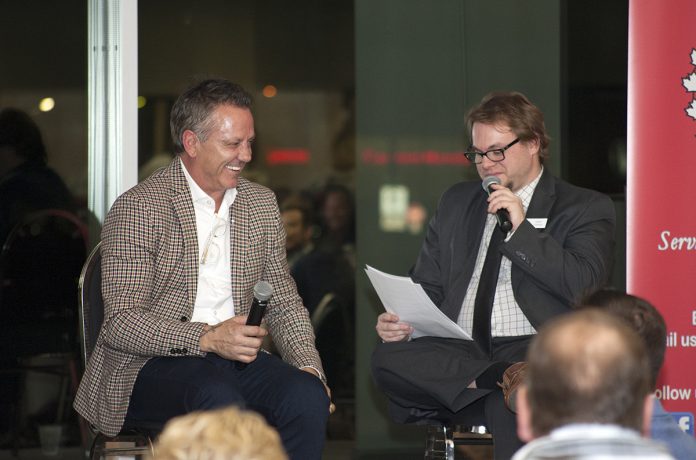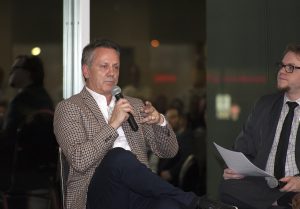
Former NHL great Doug Gilmour was nicknamed after an American serial killer.
“Brian (Sutter) was the only one that called me Charlie (after Charles Manson), and everyone else was calling me killer. After games, my eyes would be black and he’d call me Charlie.”
The Stanley Cup champion and Kingston, Ont., native spoke in Prince Albert Saturday night as the special guest of the annual Kinsmen/Raiders Sportsperson of the Year Dinner.
Before the evening’s events kicked off, Gilmour spent time on Saturday afternoon sitting down with the Herald and broadcaster 900 CKBI for a face-to-face interview.
Here’s an edited version of that conversation.
Daily Herald: In the context of giving back to the community, can you talk about your experience with the community and everyone pitching in that happens with sport, especially in small towns?
Doug Gilmour: Being in Kingston, it was many years ago I played minor hockey. In those days there was an all-star team, and there was a house league team, and there was a church athletic team. When you played on the all-star team, you also had to play on the house league team. They split the players up, so you try to make the other guys that weren’t as good better.
It’s kind of even-keel the whole way. Say three out of your guys could be playing against your teammates. In those days you only had three lines and four defence. It was fun; it helped the other guys try to get better. I thought it was brilliant back in those days doing that. But you can’t do it now – there’s too many players.
But the community of Kingston for me is just like growing up here – obviously a little bit bigger – it’s laid back. There’s the penitentiary there. It’s where my parents worked. My sister was a guard, so was my brother-in-law. So that’s what I grew up with as well.
DH: Why is it important to give back to the community that brought you up?
DG: Well I’ve been doing it for the last ten years with the junior-A hockey. I was with the Toronto Marlies in the American Hockey League (AHL), and I left to go to Kingston.
As far as my career goes, I wanted to try to go back to something. I just wanted to learn. And all I can say about that is I’m glad I went home, because I had a good five years with my dad before he passed away.
So you can say bad things about “maybe he’s just in the AHL, maybe the next step is head coach in the AHL. And then go on.”
But no, this is a move I’ll never regret whatsoever.
DH: In your playing days, thinking about attitude and the mental aspect, how much was your focus and attitude on not being deterred by critics or people saying you’re too small?
DG: Again, I was a different person when I put my helmet on. It’s another thing I say: “How many times, for twenty years, did I go to work and punch somebody and hit somebody and not get charged.” It was a lot of fun.
You take it off, you’re just like (long sigh) … “did I do that? Ok.” But when you’re into the game, sometimes you’re not in the game. You’re just going through the motions, you’re getting tired, and all of a sudden somebody hammers you. Well it’s game on. That’s the competitive side you need to have.
As for survival, I never go into a game thinking I was going to get hurt. You just go out, you play, and hopefully at the end of it you come out ok.
The game has changed so much; it was so dirty and tough back then, there was so much respect, too. If Dave Manson hits me – you can probably ask him too – I’m hitting him back in the calf as a hard as I can, and the calf shuts down by the third period. So I had my own little things of getting these guys back, and they know it.
DH: Is there anything about the way hockey has changed that’s surprised you, or you didn’t expect? Or do you just take it as it comes?
DG: It’s good. For me as a smaller player, I think it’s great. Guys can get away from guys with no slashing or hooking. I think it makes it better – I like skill, I want to watch skill. I don’t want to go to a game where (the score) goes 1-1.
I played the trap when I was with the New Jersey Devils. Was it fun? It was ok, because we won a lot. We didn’t score a lot, but we won a lot and we had a good goalie back there.
(Then head-coach) Jacques Lemaire brought it in, and it was easy. You didn’t break a sweat some days.
But also he never once said “don’t rush the puck.” Jacques wanted you to go with the puck; he wanted you to be creative.
That’s what I see. Look at the Leafs today (where Lemaire is listed as a special assignment coach). It’s great to see, it’s fun to watch, because he’s not asking guys to dump it in and go get it.
They’re making plays now they have some skill. And that’s why it’s changed – the league has to have to skill.

DH: Thinking about the issue of head injuries, CTE (chronic traumatic encephalopathy) and concussions, how do you think about that when you when you think about your kids playing and when you look back on your career?
DG: I think the biggest thing is my kids are big. They’re fast. Things are going to happen.
Knock on wood, I don’t think they had (a concussion) in junior. I had a couple. I probably had all together eight.
Unfortunately it’s part of the game. It’s the game we paly.
And our league rules (OHL) are different than your league rules (WHL). (Gilmour has coached and is currently president of Kingston Frontenacs in the Ontario Hockey League – the OHL.)
We have a three-fight rule in our league. So there’s not too many after that. There are suspensions all the time. (League commissioner) David Branch really cracked down on headshots. You get (suspended) eight games, 10 games, 12 games and then 20 games (for a deliberate head shot).
That’s tough on a kid too, because eight games is a month, and there’s not a lot of development for him.
DH: How much do you think the death of Whitby Dunlops’ player Don Sanderson impacted Dave Branch or the culture in the OHL to start thinking about head shots?
DG: Just look at the culture of when the puck went over the glass in Columbus and hit that girl, and then they put the nuts up.
(Brittanie Cecil died after being struck in the head by a puck at a Columbus Blue Jackets’ game in March 2002.)
Let’s go to the NHL side of it. You have all this talent and you’re paying all this money for it. That’s your asset. You don’t need them hurt.
But at the same time, you have recommendations looking for lighter equipment, softer equipment.
Grapes (commentator Don Cherry) has said it many times over: You fall on your elbow, you catch it on the ice, you can’t play. There’s a fine line here.
And who’s going to have the answer? I don’t know.
If there’s anything I can say about tithe game, I think they have to make the rinks ten feet wider, not longer.
You’re just going to give that skilled play that much more time.
DH: How much of it is about proper technique and protecting yourself when you play?
DG: It’s still a fine line, cause you’re on edges. Kids could be off balance. You think they might be this far off the boards.
If it’s a centre-ice hit and the guy goes up and elbows or uses his shoulder, I get it. When you crosscheck him from behind and he goes head first into the boards, I get it.
It’s a fine line – we’re on edges.
It’s too hard of a judgement call for me. I wouldn’t want to do it. I wouldn’t want to be there to say “ok, obviously you have to go get scanned and go through the green room.”
But it’s a good thing they do that now, because when I had (concussions) I tried to play through them.
DH: In the context of Saskatchewan’s Indigenous kids who are coming from poverty and dealing with the history of residential schools, what role can sport play for kids who are born into a pretty crappy life situation?
DG: Sports are so expensive. So any help current NHL players can do to get them into sports goes a long way, just in life in general.
The team bonding – obviously the team bonding, to you’re at he rink, you’re not doing something you shouldn’t be doing.
I think it’s very, very important for everybody. It could be soccer, it could be baseball, it could be lacrosse, whatever. And you can do something that’s good for your body, and it’s also good to know people.

